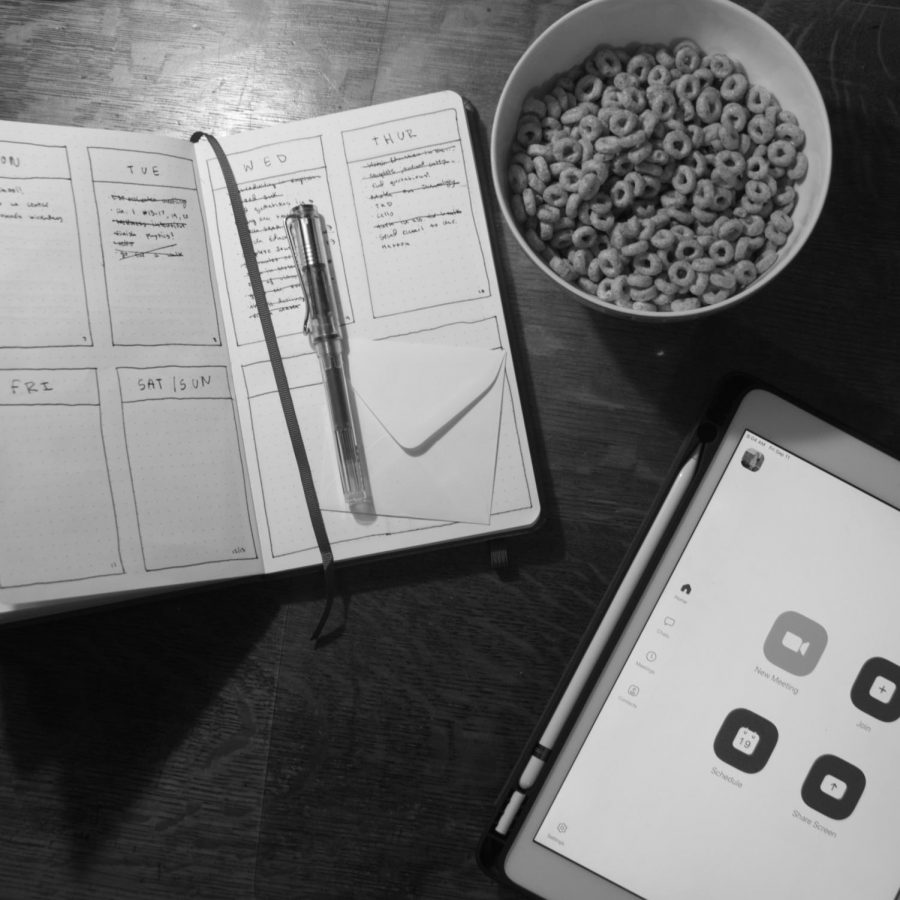With a Digital Start To The School Year, Students and Teachers Speculate About Testing and Homework
Some students and teachers have opted for paper planners to manage their work, while others use digital calendars or the Schoology app. Sophomore Brenna Marcella uses a whiteboard to write down her assignments. “When I’m done with it, I like to erase it,” Marcella said. “It leaves me feeling accomplished.”
September 16, 2020
With entirely digital classes, wildfires burning through the west coast, a pandemic out of control, and power outages darkening houses around Oregon, students and staff have a lot to manage this year. However, one priority still stands for many students: make it through the school year with good grades.
But with such an abnormal situation, how can students achieve this?
Some AP classes assigned homework over the summer to students in order to prepare them for the upcoming school year. “AP classes are no joke,” said senior Stella Mack, who is taking AP Chemistry, AP Calculus II (BC), AP English 4, AP Spanish 5, and AP US Government and Economics this year. “They will assign you stuff right off the bat.”
Mack said that it has been a challenge adjusting to online classes.
“I understood it when we actually went to school because then I would get actual interactions with people, but with this, it’s just screen after screen after screen,” Mack said. “I spend all day on a screen, and then I have to spend even more of my time on a screen.”
For other classes, the homework load is lighter. “I don’t assign a lot of homework anyway,” English teacher Ms. Stephanie Vermeychuk, also known as Ms. Verm, said. “I know a lot of [students] are taking other AP classes that are more content-driven, and tend to be heavier on homework, like APUSH and Bio and all that, so I try to minimize the amount of homework I give.”
“Given the current situation, I know there will be things that come up that wouldn’t come up if we were in person,” Ms. Verm said. “I’m pretty flexible [and] pretty reasonable if people ask for an extension, as long as it’s not like, five minutes before the thing is due.”
If students have a late homework assignment, it is “not going to be the end of the world,” science teacher Mr. Eric Roth said. However, he said, this may hurt students in the long run when it is time for summative tests and projects. “You should do [your homework], just because it will build on when you actually have to take the test.”
Some teachers, like Ms. Verm, rarely gave tests in the regular school year, other than her reading quizzes. “What I’ll probably do is rather than short-answer quizzes, [I’ll] just do paragraph responses,” she said. “I feel bad for chemistry and math teachers because they’re really going to have to figure out how to test, because people are going to cheat.”
Mr. Roth, along with other science teachers, is trying to reformat the science classes in order to circumvent this issue. “We’re going in there and trying to rework things so that they’re really palatable and digestible for students, and also not boring,” Mr. Roth said.
To achieve this, many classes in the science department are building their lessons from the top down: starting with national standards, then moving towards learning objectives and goals, then turning those into lessons. “So instead of just charging into the lessons, we actually make the lessons around what we want to ask in the tests,” Mr. Roth said.
However, he said that there will still be a similar amount of testing and project work — the emphasis will simply be on the latter instead of the former. “Tests also provide a certain understanding of something, but I think project work is more creative and can be more [expressional] of who you are, and that makes it more authentic,” Mr. Roth said.
As for how students would handle testing if they were in charge, Mack and sophomore Brenna Marcella are in agreement: although it may be difficult for students and staff alike, the most honest way would be through a live Zoom call, monitored by teachers while students take the test digitally.
“It’s kind of hard to see from both perspectives,” Marcella said. “For me, I probably wouldn’t want to have to do one live on Zoom… but as a teacher, I feel like it makes sense to do it in real time.”
However, there are still several loopholes to this solution, which both students pointed out.
“I think it’s kind of pointless to have a serious test online because it’s just so easy for people to cheat,” Mack said. “You could hold your notebook off of the camera, or say your connection is bad… It should be more reasoning and deducting, so that you can show that you have an understanding of a topic, and not just look up a definition.”
For Ms. Verm’s English classes, she is using essays instead of tests, with the exception of her reading quizzes. “I don’t know, that’s a real challenge, figuring out assessments and stuff,” she said. “Fortunately with essays, that’s a whole different ball game… If people plagiarize, I can tell.”
Ms. Verm plans on keeping a similar number of essays in her class this year in comparison to previous years, but she wants to remind students that “nothing is worth sacrificing your integrity for.”
“I know that that’s not the stance that all students take because the grades are a big motivator, and I get that,” Ms. Verm said. “I kind of wish that weren’t the case, but that’s how it is.”
To help students feel less pressured by homework and tests, some classes are switching to a “flipped classroom” model, using asynchronous Wednesdays to their advantage. “I hope — God willing — that if we do go back to real school, that they keep that,” Ms. Verm said. She said that the consistency and flexibility of the asynchronous learning days is beneficial to both students and staff.
Mack said that she also appreciates asynchronous learning time. “I work on Wednesdays, so it’s really nice for me not to have a synchronous day that day,” she said.
Mr. Roth plans on giving homework on Wednesdays for his students. “Mostly it’s really for you to do readings, or to do some type of background work so that you come to classes on synchronous days and you’re already engaged,” he said.
Ms. Verm plans on leaving asynchronous days as workdays for her students. “What I’m planning is that I’m going to never assign anything on that Wednesday to be due on that [day],” she said. “That doesn’t seem reasonable to me, just given in the context of this year.”
Ms. Verm said that something might be due Wednesday at 10 p.m., but that it will have been assigned on Monday or Tuesday, “so it will not be less than a 24-hour turnaround.”
Alongside the new asynchronous Wednesday, the rest of the bell schedule starts later than the previous bell schedule, and also ends later. “It gives me more time to sleep in, which is honestly great,” Marcella said.
Despite these accommodations, some students will still struggle with the challenges of attending classes digitally rather than in person.
“It’s hard,” Mr. Roth said. “It’s hard for students to sit there [on] Zoom all day long with teachers chatting at them… [But] it could be a lot worse.”
“This is what school is going to look like for the next couple of months, so from a college standpoint to the elementary school standpoint, we’re just trying to embrace this as best as we can,” Mr. Roth said. “I think students need to start embracing it, because everyone is doing it.”





